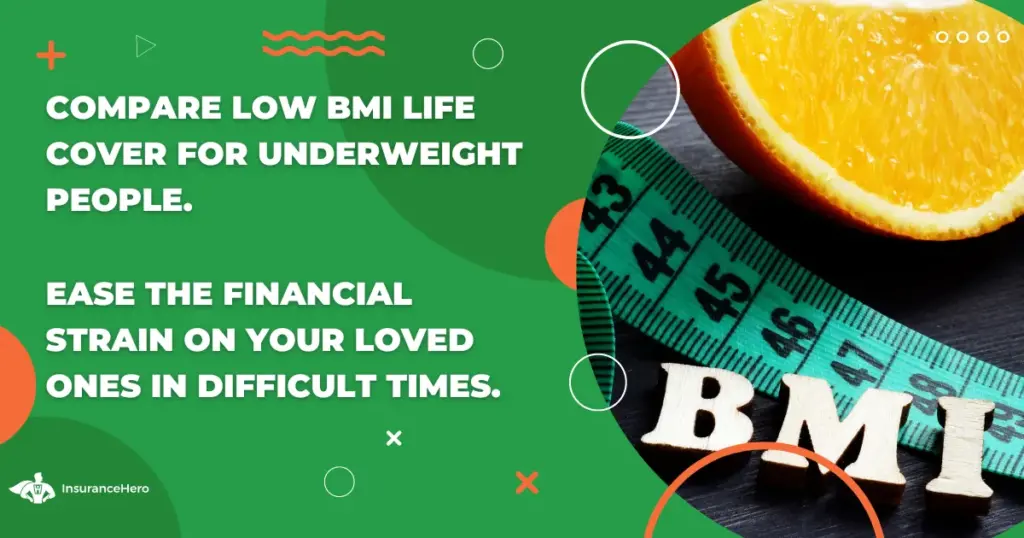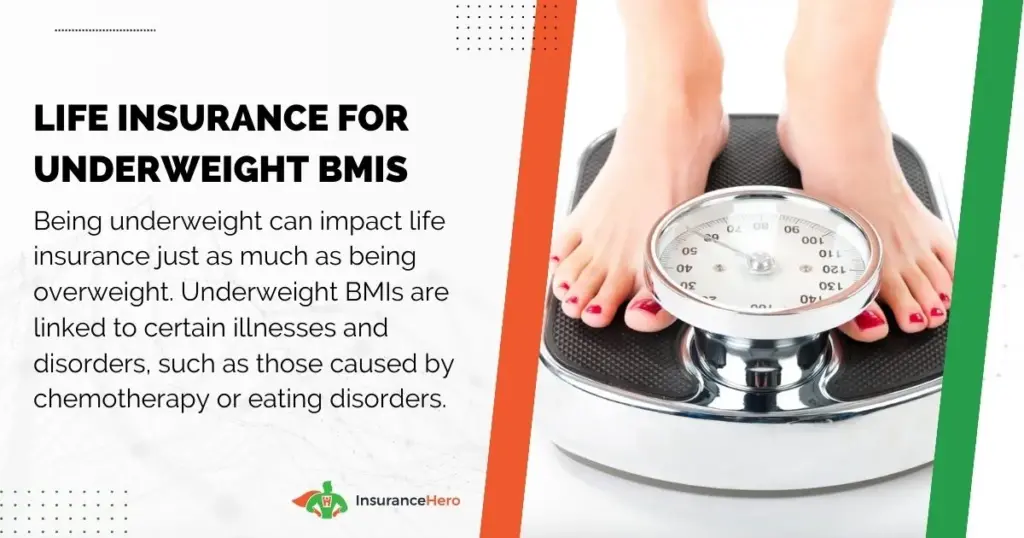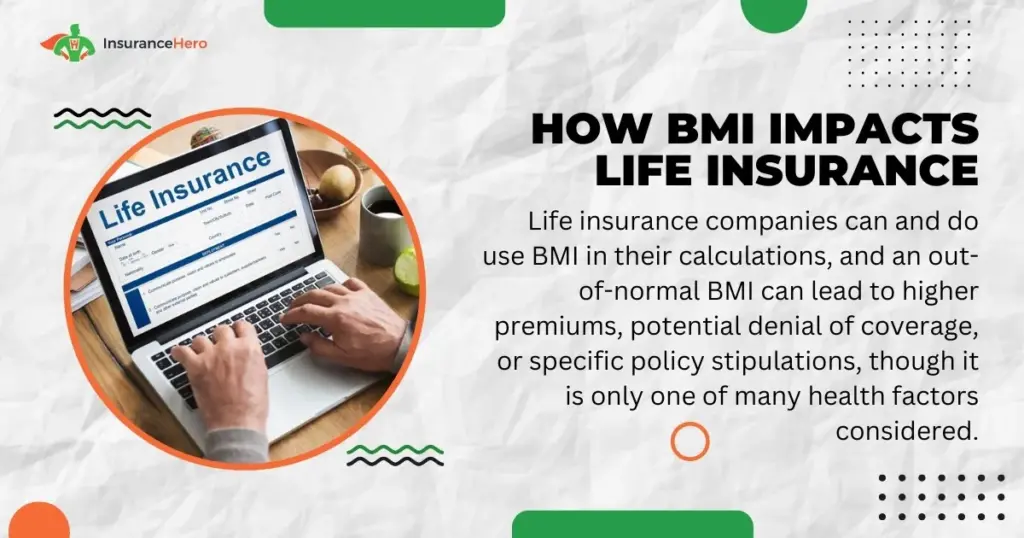Low BMI Life Insurance Cover For Underweight People

You can often secure life insurance coverage even if you are underweight or have a low BMI.
Many insurance companies offer policies for people with lower body mass indexes, though you must share information about your situation.
While there isn’t a distinct policy labelled as “underweight life insurance” or “low BMI life insurance,” the term describes life insurance acquired by people with lower body weight.
Low BMI and Life Insurance in Summary:
It’s important to understand how BMI, or body mass index, affects life insurance. BMI, or Body Mass Index, is a measure derived from height and weight that estimates health risks.
Insurance Hero can help you find the most comprehensive and cost-effective underweight life insurance policies.
Here’s what we’ll cover:
- BMI Impact: Life insurance companies consider BMI one of several factors determining risk. Low and high BMIs can influence premiums and coverage options.
- Health Risks: A BMI that falls outside the normal range may be associated with various health problems, affecting insurance decisions.
- Customisable Cover: Regardless of your BMI, you can discover various cover options by comparing quotes from providers like Insurance Hero.
Low BMI? Compare The Top UK Insurers · No Obligation · Free Quote Below


Life Insurance for Underweight BMIs
While obesity is a significant issue around the world, BMI has a lower bound, and being underweight can be just as bad in some ways as being overweight.
Being underweight can affect life insurance because, much like overweight BMIs, underweight BMIs can be with certain illnesses or disorders.
Some medical conditions and treatments, such as chemotherapy, for example, can lead to being underweight and impact your life insurance. Eating disorders, similarly, can have a negative impact.
Suppose your BMI is below the normal range. In that case, your low BMI life insurance provider will likely want to ask additional questions, such as whether you’ve been diagnosed with diseases or disorders that can cause it or if there’s a physical reason that could explain it.
They will then decide what kind of premiums and what level of cover they can offer you.
Is Life Insurance Worthwhile if You’re Underweight?
Of course! No matter your health situation, life insurance can be excellent for both peace of mind and securing the future of your loved ones should you pass.
And, like overweight insurance, if you’re underweight but end up addressing underlying issues and gaining weight to reach a healthy BMI, you can inform your provider and potentially get an adjusted premium.
In most cases, you will end up with slightly more expensive coverage unless you have serious health issues, which could be either significantly more expensive or denied.
Again, this varies from provider to provider, so you’ll want to compare life insurance quotes to ensure you’re getting the best possible coverage for the best price.
Life insurance works by evaluating your overall health according to various known factors and placing you in a particular risk bracket.
This bracket determines primarily the cost of your insurance premiums.
It works as a way to categorise risk. People with worse overall health, according to a variety of metrics, are, statistically speaking, more likely to die sooner than people in better health.
While you might defy the odds individually, the statistics bear out across the whole UK population.
Insurance providers use these statistics with term life insurance policies to manage risk. After all, a provider makes a net profit if someone outlives their cover.
This is why it’s better to have good health when you apply for life insurance coverage and to do so as early as possible while you’re still young. There is no greater determination of health outcomes than age.
That said, you may know that certain aspects of health are either off-limits or cannot be factored into your evaluation. Genetic testing, for example, is currently not allowed outside of extremely specific cases, which you can read about here.
So, is BMI one of the factors that matters, or is it something the life insurance companies can’t ask for or use? Let’s talk about it.

What is BMI?
BMI stands for Body Mass Index. It’s a relatively simple calculation that takes your weight and divides it by your height in square meters.
Here’s the example the NHS gives:
For example, if you weigh 70kg (around 11 stone) and are 1.70m (around 5 foot 7 inches) tall, you work out your BMI by:
squaring your height in metres: 1.70 x 1.70 = 2.89
dividing your weight in kilograms: 70 ÷ 2.89 = 24.22
Your result will be displayed to one decimal place, for example, 24.2.
You can also calculate in imperial units, with weight in pounds and height in inches squared.
Fortunately, you don’t need to do the maths yourself. The NHS provides its own calculator here, and many other calculators are available online.

The idea of BMI is that you can’t necessarily be called overweight or underweight based solely on your weight. Someone over 2m tall and 1.3m tall, both weighing the same, will have vastly different body shapes and overall health at that weight.
The basic numbers aren’t adequate on their own, but since weight impacts health overall, something needed to be created to more accurately estimate the impact of weight on health and give you a numerical indicator of where you stand on the spectrum.
BMI is considered normal if it’s between 18.5 and 25. Anything under 18 is considered underweight. Meanwhile, a BMI between 25 and 30 is considered overweight, and anything over 30 is considered obese.
This range was built upon the actuarial tables used by groups like life and health insurance providers, so those using it come full circle. The further from the normal BMI range, the greater the risk of adverse health impacts.
For example, all of these have been correlated with a high BMI:
- Diabetes
- Certain Cancers
- Arthritis
- Liver Disease
- Hypertension
- High Cholesterol
- Sleep Apnea
All of these, additionally, can lead to further adverse health impacts and, eventually, potentially even death.

The Drawbacks of BMI
For all the weight that is put on BMI, it’s not a perfect metric. There are many factors other than weight and height that can impact health, and even skew the results of BMI.
Muscle is denser than fat. This means that someone who is relatively healthy and works out frequently can have a BMI that classifies them as obese, even though they’re much more nutritious than someone in a more normal BMI range because of their dedication to fitness and exercise.
BMI changes during pregnancy. If you’re carrying a baby, your BMI will be higher. Pregnancy also has health impacts, of course, but not in the same way as obesity. This is why most BMI calculators say not to use them if you’re pregnant because they’re unreliable at that point.
Physical conditions can skew the results. An easy example would be an amputee; someone losing a leg will be much lighter for their height and would consequently have either a BMI more in the normal range despite obesity or an underweight BMI despite being in the normal range otherwise. This is just one example; many such factors can skew the results.
BMI doesn’t predict or account for other illnesses. It can’t even predict or be directly causative of the diseases linked to it. People who are pretty high on the BMI charts can still have normal blood pressure, blood sugar, and even cholesterol; meanwhile, otherwise healthy-looking individuals can have underlying diseases.
BMI doesn’t appropriately consider race. The original BMI charts and the idea of what is normal were developed primarily on white patients. Studies have shown that using the same BMI charts leads to overestimating the risk of problems in black individuals and underestimating them in Asian individuals.
These are just some of the issues with BMI.
However, this is important: BMI is not the only measure used. On its own, it’s a lousy metric for evaluating health. You can’t look at someone’s BMI in the abstract and judge their situation.
However, when used in conjunction with other test results and metrics, such as blood tests, fitness and activity levels, and other information typically asked about on health screeners, it can contribute to a more robust overall picture of one’s health.

How BMI Impacts Life Insurance
First, let’s answer the question: Can life insurance companies use BMI in their calculations?
The answer is yes. Even if they weren’t allowed to ask, your height and weight are valid information to ask, and from there, they could calculate it themselves, which is precisely what they did many years before BMI as a public metric took hold.
Nothing prohibits insurance firms from using BMI as one of the factors in their calculations.
The second question, then, is whether insurance providers use BMI. The answer is yes because, despite the abovementioned flaws, it’s still an essential metric indicating certain health risks.
But again, they don’t use it in isolation; it’s one of many factors considered in a complex set of actuarial tables that determine risk.
How does BMI impact your life insurance?
- An out-of-normal BMI can lead to higher insurance premiums for coverage.
- An extremely out-of-normal BMI can lead to being denied coverage, depending on the provider’s limits.
- The insurance provider might stipulate specific riders or add-ons to cover to exclude/include specific causes of death.
Again, though, BMI is just one of many factors considered. It’s also one of the easiest to adjust, so if you have a high BMI and decide to lose weight to bring it into the normal range, you may be able to ask for a reassessment and lower your cost of cover.

Life Insurance for Overweight BMIs
If you are overweight or have a higher-than-normal-range BMI, you may find it harder or more expensive to get the overweight life insurance you want from the providers you reach out to.
Some providers put limits on the coverage they will offer. For example:
- The Exeter won’t cover anyone with a BMI over 53.
- Royal London won’t cover anyone with a BMI over 46.
- LV= won’t cover anyone with a BMI over 46.
- AIG won’t cover anyone with a BMI over 46.
- Guardian won’t cover anyone with a BMI over 44.
For the most part, the major insurance providers are all in the same range.
Two other factors also influence this. Many of these are age-gated as well. To use The Exeter as an example, the limit is a BMI of 51 for anyone under 44; for ages 45-59, it’s 53, and for anyone over 60, it’s 41.
The older you are, the more likely your BMI is to impact your health, which increases the risk to the insurance provider.
The second factor is other health conditions. For example, if you have a high BMI and have also been diagnosed with diabetes, you will likely find it harder to get life insurance coverage, and if you do, it will be more expensive.
Simply put, this is because your health conditions put you at greater risk of dying during the term of your life cover, leading to a payout of benefits and that corresponding financial loss to the insurance provider.
In a sense, you can consider BMI status a multiplier on other health conditions and statuses that would be either good or bad on the actuarial tables.

Is Life Insurance Worthwhile if You’re Overweight or Obese?
Life insurance can be more expensive depending on the amount of coverage you want. At the same time, though, you’re statistically more likely to end up getting that payout to your loved ones, so if securing their future is something that weighs heavily on your mind as well as your body, getting life insurance – even at a higher price point – is a good idea.
Fortunately, life insurance isn’t going to refuse to pay out because of your BMI, as long as you’re honest with them when you’re signing up.
Most modern life insurance companies have a very high rate of successful claims because they’re thorough in their investigations and keenly aware of the fraud that can go on to stop it before it reaches that point.
What’s the best life insurance for someone with a high BMI?
That varies depending on your needs and other circumstances. Instead of shopping alone, you can use our service to compare life insurance quotes from the UK’s best providers.
There’s no cost or obligation; fill out our form, and the quotes will be delivered for you to evaluate. We’re also always standing by to answer any questions you may have so you can get the cover you deserve.
Steve Case is a seasoned professional in the UK financial services and insurance industry, with over twenty years of experience. At Insurance Hero, Steve is known for his ability to simplify complex insurance topics, making them accessible to a broad audience. His focus on clear, practical advice and customer service excellence has established him as a respected leader in the field.


